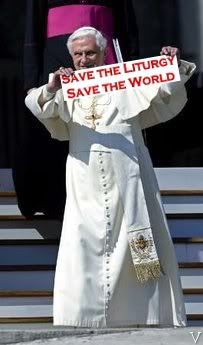Fr. Raymond J. de Souza writes in the Catholic Register (Canada) of how the new missal translation is a sign of hope for and confidence in the future:
A Polish (John Paul II) and German (Benedict XVI) Pope, working together in Italian, were instrumental in bringing together the beauty that is seen in the new Roman Missal — though the true hero was Chilean Cardinal Jorge Medina Estevez, according to Fr. de Souza. CNS photo/Eliseo Fernandez, Reuters
If you were to follow the secular press and, to be honest, much of the religious press, the impression could be had that the Christian Church is beset by moral controversies, political conflicts and managerial challenges. The idea that a Christian community could devote enormous energies over more than a decade on the right worship of God is refreshingly encouraging. That the Catholic Church, so often portrayed as battered and bewildered, could put in good order the most important thing she does — the worship of God — means that the shepherds of the Church have not lost track of her mission, even if others have lost the story.
A translation for the entire English-speaking world necessarily involves collegial work by a wide array of Catholics from different parts of the world. Which other Church could manage that today? A great sadness of the 21st century will be the accelerating death of large parts of the Christian Church, especially in its historic homelands. In many parts of world Christianity, gathering leaders together simply to meet has become a task too difficult. The prospect of actual agreement is pure fantasy. Catholics acknowledge that our capacity to do so is not our work, but the grace of the Petrine ministry as the rock of the Church’s unity. Is it not a marvel of Providence that a Polish and German Pope, working in Italian, would be instrumental in the beauty of our English translation? The real hero of the whole piece was actually a Chilean cardinal, Jorge Medina Estevez — about whom more in a later column.
The new translation is a mark of renewed confidence in the future. I don’t mean the theological virtue of hope, but rather something on the natural plane, namely a sense that the future is not all bleak. That confidence permits a global project that will outlive many who worked on it. Communities that are only managing terminal decline do not engage in such bold action.
Read the entire piece, "New Missal bodes well for the new evangelization" (Dec. 7, 2011). I'm curious to see the promised column about Cardinal Jorge Medina Estevez as I don't know much of anything about his involvement with the translation. I do know, however, that two of his excellent books have been published by Ignatius Press: Lord, Who Are You? and Male and Female He Created Them.


